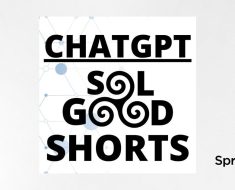
Companies are constantly seeking innovative ways to streamline operations, improve customer service, and reduce overhead costs.
One of those innovations that has gained significant traction in recent years is the use of ChatGPT, a powerful language model developed by OpenAI, for various tasks that were traditionally performed by humans.
In this post, we’ll explore the fact that many companies are using ChatGPT to save money in tasks where a human could also be used, and the impact it has on their bottom line.
The Rise of ChatGPT in Business
ChatGPT is part of a family of AI models that excel in natural language understanding and generation. Its ability to generate human-like text responses and adapt to different contexts has made it a valuable tool for businesses across various industries.
The introduction of ChatGPT 3.0 in 2022 signalled a renewed interest in the potential of generative AI.
An excellent way to understand this pattern is to look at how Google’s interest in generative AI differs from 2022 to 2023, with interest increasing quickly.
We can probably expect this interest to continue as more generative AI programs are being developed and ChatGPT and others want to release upgraded chatbot versions in the future.
From customer support to content generation, ChatGPT is being used to automate and streamline tasks that would otherwise require human intervention.
Customer Support: A Prime Example
One of the most common use cases for ChatGPT in the business world is in customer support. Traditionally, companies have employed teams of customer service representatives to handle inquiries, complaints, and requests from customers. These teams are essential for ensuring a positive customer experience, but they can also be costly to maintain.
Enter ChatGPT. Many companies are now using this AI-powered chatbot to handle routine customer queries and support tickets. ChatGPT can quickly provide answers to frequently asked questions, troubleshoot common issues, and even guide users through simple problem-solving steps.
All of this is done with incredible efficiency, and without the need for human involvement.
That’s the scariest part.
Cost Savings in Customer Support
The cost savings associated with using ChatGPT for customer support are substantial. Let’s break it down:
- Reduced Labor Costs: By automating a significant portion of customer support tasks, companies can reduce their reliance on human customer service representatives. This translates to lower labor costs, including salaries, benefits, and training expenses.
- 24/7 Availability: Unlike human agents who need breaks and sleep, ChatGPT can provide support around the clock. This means companies can serve their global customer base at any time without incurring additional overtime or night-shift costs.
- Scalability: As a company grows, it can easily scale its customer support capabilities by deploying additional instances of ChatGPT. This scalability allows businesses to handle increased customer demand without a proportional increase in staffing costs.
- Reduced Errors: Human agents may make mistakes or provide inconsistent answers. ChatGPT, on the other hand, consistently delivers accurate and consistent responses, reducing the potential for costly errors and customer dissatisfaction.
Content Generation and Marketing
Beyond customer support, ChatGPT is also making waves in the realm of content generation and marketing. Creating engaging and informative content is a critical aspect of digital marketing, and it often involves significant time and effort.
Blog Posts and Articles
Many companies are now using ChatGPT to generate blog posts, articles, and other written content. ChatGPT can research topics, generate drafts, and even optimize content for SEO.
While it’s true that humans can do this as well, ChatGPT offers several advantages:
- Speed: ChatGPT can produce content at a much faster rate than a human writer, allowing companies to maintain a consistent content schedule.
- Cost-Effective: Hiring professional writers can be expensive. ChatGPT offers a cost-effective alternative, particularly for businesses with tight budgets.
- Scalability: Companies with ambitious content marketing goals can easily scale their content production by utilizing multiple instances of ChatGPT.
Social Media Management
Social media management involves the activities and processes a business or individual undertakes to effectively plan, execute, monitor, and optimize their presence on social media platforms. It’s a critical aspect of modern digital marketing and brand management.
Here’s how ChatGPT can handle aspects of social media management:
Content Generation
One of the primary challenges of social media management is consistently producing high-quality content that engages the audience. Traditionally, businesses have relied on human social media managers or content creators to craft posts, respond to comments, and maintain an active presence. However, this approach can be resource-intensive.
ChatGPT changes the game by automating content generation. It can create social media posts, draft responses to comments, and even generate captions for images and videos. This automation not only saves time but also cuts down on labor costs. Companies can schedule posts in advance, ensuring a steady stream of content without the need for a dedicated team to be constantly at the helm.
Responding to Comments and Engagement
Engaging with the audience on social media is essential for building a strong online presence. Users expect timely responses to comments, questions, and messages. While human social media managers excel at this, they are limited by working hours and the need for breaks.
ChatGPT, on the other hand, can provide 24/7 engagement. It can quickly respond to standard inquiries, acknowledge comments, and even initiate conversations based on predefined guidelines. This round-the-clock availability not only enhances user satisfaction but also eliminates the need for overtime or night-shift costs associated with human management.
Data Analysis and Optimization
Effective social media management also involves data analysis to measure performance and optimize strategies. This includes tracking key metrics such as engagement rates, reach, and conversion rates. Human social media managers often spend significant time crunching numbers and making data-driven decisions.
ChatGPT can assist in this aspect as well. It can analyze social media data, generate reports, and provide insights into what is working and what needs improvement. This enables businesses to make informed decisions faster and more efficiently.
Scaling Efforts
As a company grows or expands its social media presence to multiple platforms, managing the increasing workload can become challenging. Hiring additional social media managers to handle the load can significantly increase labor costs.
With ChatGPT, scalability becomes a breeze. Businesses can deploy additional instances of the AI model to manage new social media accounts or handle increased activity. This flexibility allows companies to grow their online presence without incurring proportionate staffing costs.
Maintaining Consistency
Consistency in brand voice and messaging across social media platforms is crucial for building brand identity. Human managers may inadvertently deviate from the established guidelines or tone of communication.
ChatGPT, when trained and guided properly, ensures consistent messaging. It adheres to predefined brand guidelines, maintains a uniform tone, and delivers messages that align with the company’s image.
ChatGPT is a game-changer in social media management. By automating content generation, providing 24/7 engagement, aiding in data analysis, enabling scalability, and maintaining brand consistency, it not only enhances efficiency but also delivers significant cost savings. Companies can now harness the power of AI to manage their social media presence effectively while redirecting resources to other critical aspects of their operations.
This shift towards AI-driven social media management represents a cost-effective and forward-thinking approach that many companies are adopting to stay competitive in the digital landscape.
Share of companies saving money using ChatGPT U.S. 2023
Approximately 24% of the organizations surveyed by American business executives in February 2023 reported that they had saved between $50,000 and $70,00 utilizing ChatGPT in their workflow.
Furthermore, 11% of respondents claimed to have saved over $100,000 USD since integrating ChatGPT into their operations.
Data Entry and Administrative Tasks
In addition to customer support and content generation, ChatGPT is being deployed for data entry and administrative tasks.
In the daily operations of businesses, numerous administrative tasks require data entry and management. Traditionally, these tasks have been performed by human employees, often consuming a substantial amount of time and resources. However, the introduction of ChatGPT has paved the way for a more efficient and cost-effective approach to handling administrative and data-related functions.
Data Entry and Validation
Data entry is a critical but often repetitive and labor-intensive task. It involves the input of various types of information into databases, spreadsheets, or other digital systems. Human data entry operators may spend hours manually transcribing data, which can be error-prone and time-consuming.
ChatGPT can significantly expedite this process. By training the AI model on specific data entry requirements, companies can use ChatGPT to automate data entry tasks. The AI can swiftly and accurately enter data, reducing the risk of errors and eliminating the need for dedicated data entry personnel.
Form Filling and Document Processing
In addition to data entry, administrative tasks often involve form filling, document processing, and template generation. This can include tasks like completing standard forms, generating invoices, or creating reports based on specific templates.
ChatGPT can be programmed to handle these tasks efficiently. It can generate documents and forms based on predefined templates, populate them with relevant data, and even validate information to ensure accuracy. This not only saves time but also ensures consistency in document formatting.
Record Keeping and Documentation
Effective record keeping is essential for regulatory compliance, auditing, and historical reference. Managing large volumes of records, whether they are physical or digital, can be resource-intensive and prone to errors.
ChatGPT can assist in organizing and cataloging records. It can help with metadata tagging, indexing, and retrieval of information. This streamlines the process of record keeping and makes it easier to access critical data when needed.
Cost Savings in Data Entry and Administration
The cost savings associated with using ChatGPT for data entry and administrative tasks are substantial:
- Reduced Labor Costs: By automating data entry and administrative functions, companies can reduce their reliance on human personnel for these tasks. This translates to lower labor costs, including salaries, benefits, and training expenses.
- Error Reduction: Human data entry can lead to errors that necessitate time-consuming corrections. ChatGPT’s accuracy minimizes the need for error rectification, saving both time and resources.
- Scalability: As businesses expand or encounter increased data entry demands, they can easily scale their capabilities by deploying additional instances of ChatGPT. This scalability allows for flexibility in handling growing workloads.
- Time Efficiency: ChatGPT’s speed in data processing and administrative tasks means that these functions are completed more quickly, freeing up human employees to focus on higher-value tasks.
- Consistency: ChatGPT ensures consistent data entry and document formatting, reducing the risk of discrepancies and maintaining professional standards.
ChatGPT is transforming how companies manage data entry and administrative tasks. Its ability to automate these functions efficiently and accurately not only saves money but also enhances productivity and reduces the risk of errors.
Companies are increasingly adopting ChatGPT to streamline their operations and redirect resources to more strategic and value-added activities.
The Human Touch
While ChatGPT is undoubtedly a valuable tool for many business tasks, it’s important to recognize that there are limitations to its capabilities. There are instances where the human touch is irreplaceable, especially in situations requiring empathy, complex decision-making, or creative problem-solving.
For example, in industries like healthcare, where patient care and safety are paramount, AI can assist but should not replace the expertise and compassion of medical professionals.
Similarly, in high-stakes legal issues, the guidance of experienced lawyers is extremely important.
Conclusion: A Balancing Act
ChatGPT is transforming the way companies operate and save money. Its ability to handle routine and repetitive tasks efficiently has led to significant cost savings across various industries.
However, it’s crucial for businesses to strike a balance between automation and the human touch, recognizing that while AI can excel in many areas, there are situations where human expertise and empathy are irreplaceable.
As companies continue to harness the power of ChatGPT and similar AI technologies, it will be interesting to see how this delicate balancing act evolves in the years to come.
One thing is clear: ChatGPT is here to stay, and its impact on business operations and cost savings will only continue to grow.




